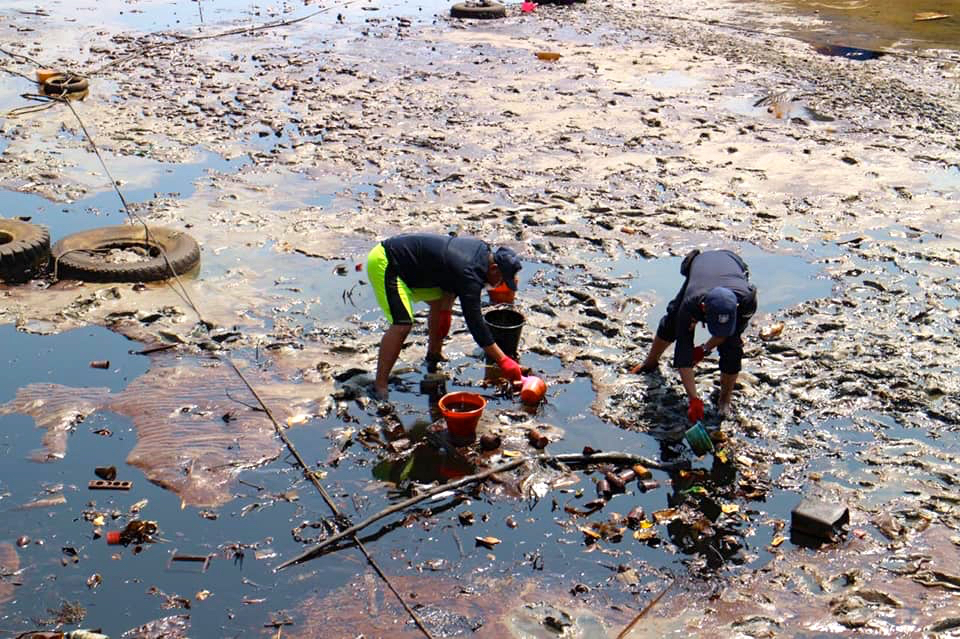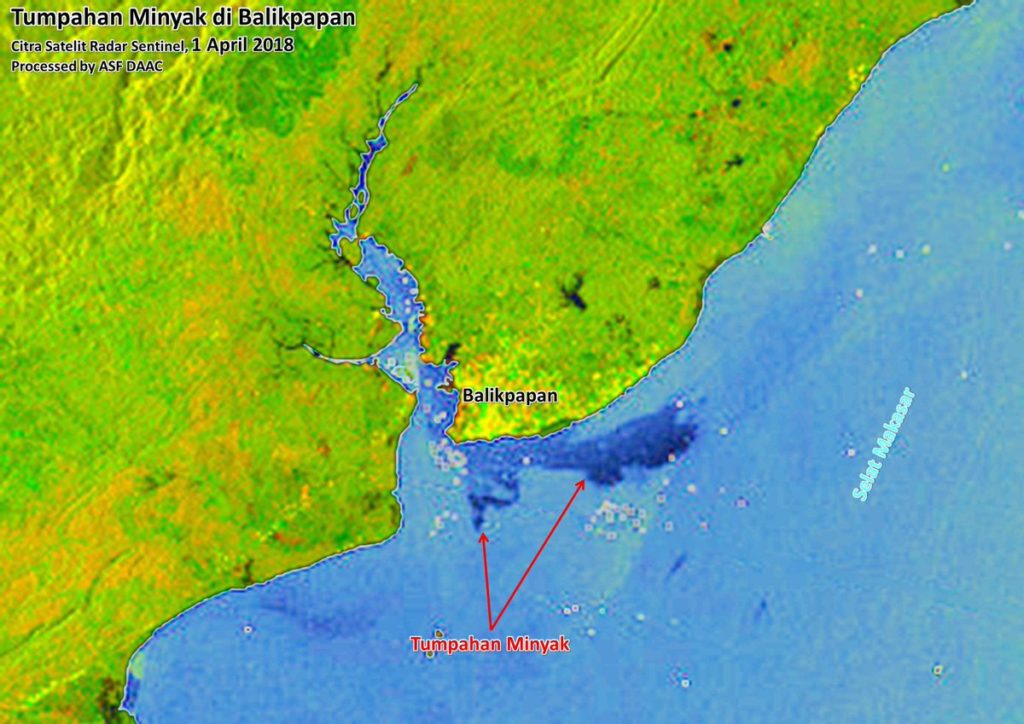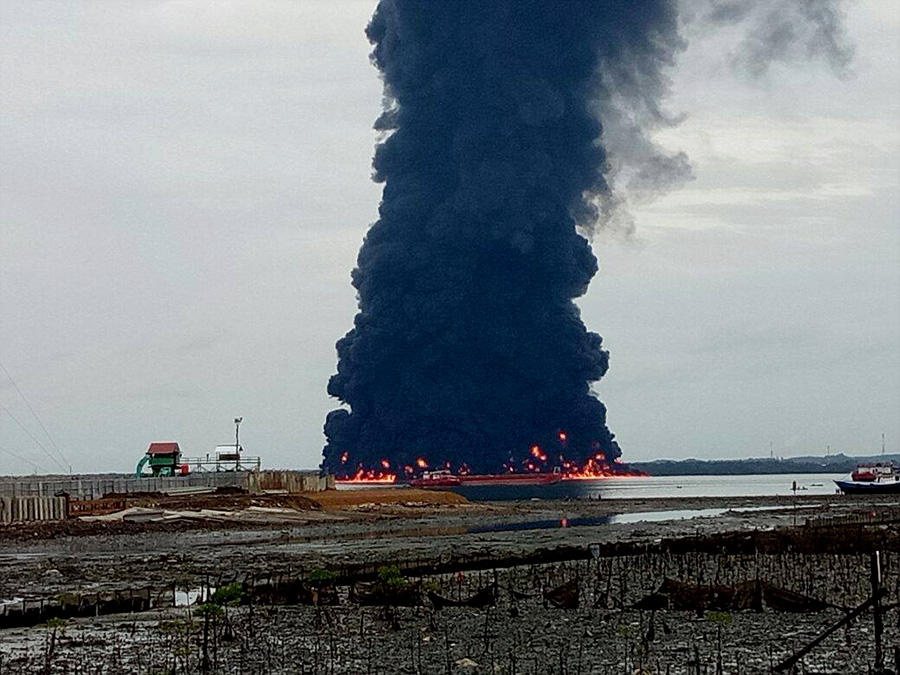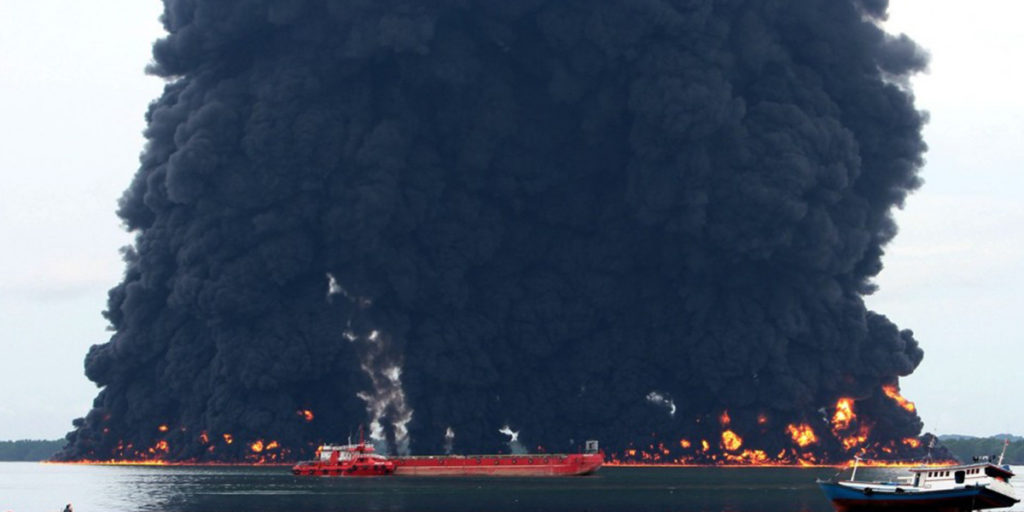Deadly Oil Spill in Eastern Borneo Spreads to the Open Sea
ENVIRONMENT, 9 Apr 2018
Basten Gokkon | Mongabay [Indonesia] – TRANSCEND Media Service
Oil Spill Now Larger Than Paris Ravages Indonesian Island, 5 Dead

Indonesian officials clean up parts of the coast of Balikpapan Bay swamped with crude oil.
Photo courtesy of the Environment and Forestry Ministry.
- An oil spill that began on March 31 in Balikpapan Bay has spread out to the Strait of Makassar and now covers an area of 130 square kilometers (50 square miles) — larger than the city of Paris.
- Indonesian state-owned oil company Pertamina has admitted responsibility after days of denials, but suggested the damage to its undersea pipeline was caused by a vessel passing through the area.
- The disaster has claimed the lives of five fishermen, contaminated a mangrove forest, prompted thousands of health complaints, and been linked to the death of an endangered dolphin.
5 Apr 2018 – An oil spill in Borneo that began over the past weekend has now spread across an area greater than the city of Paris and is heading out to the open ocean, the Indonesian government says.
The spill, first reported on March 31, stems from a pipeline operated by state-owned oil firm Pertamina in the city of Balikpapan, in East Kalimantan province. A report released April 4 by the Ministry of Environment and Forestry said the slick was spreading out from Balikpapan Bay and into the Strait of Makassar, covering some 130 square kilometers (50 square miles).
Pertamina, which for days had denied responsibility for the disaster, finally admitted on April 4 that one of its pipes used for transporting crude oil was the source of the slick.
“Our preliminary investigation had indicated that the oil was ship fuel, but it was only until [the evening of April 3] that we got confirmation that it was from us,” Pertamina general manager Togar M.P. told reporters. “Ever since the incident was discovered, we have shut down the pipes.”

A satellite image dated April 1 shows the extent of area that is covered with crude oil from an undersea pipe leakage in Balikpapan Bay.
Photo courtesy of the Indonesian National Disaster Mitigation Agency (BNPB).
The incident has been blamed for the deaths of five fishermen in a fire sparked by clean-up workers who were trying to clear the oil by burning it off the water’s surface.
Some 34 hectares (84 acres) of mangrove forests are covered in oil, the environment ministry report said. The slick is also believed to have led to the death of an endangered Irrawaddy dolphin (Orcaella brevirostris), a protected species under Indonesian law, which was found washed up on the coast near the site of the spill.
Thousands of people in Balikpapan, a city of 700,000, have also complained about health problems from the toxic slick.
Authorities declared a state of emergency in the city on April 3, and warned residents not to light cigarettes in the area. They also distributed gas masks to protect against the acrid fumes and smoke.
“Dolphins have died from oil spills in Balikpapan Bay. The marine waters are polluted. Until now the impact of oil the spill can not be overcome,” said Indonesian National Board for Disaster Management Sutopo Purwo Nugroho.
(via Google Translate).
Ikan pesut dan lumba-lumba mati akibat tumpahan minyak di Teluk Balikpapan. Pantai perairan laut tercemar. Hingga saat ini dampak tumpahan minyak belum dapat diatasi. pic.twitter.com/O0Pn90ZxLy
— Sutopo Purwo Nugroho (@Sutopo_PN) April 4, 2018
The East Kalimantan police and Pertamina are investigating the cause of the leak, after divers from the company found the pipe had moved some 100 meters (328 feet) from its initial position on the seabed.
Togar suggested “an external heavy force” had caused the damage to the 20-year-old pipe. Balikpapan Bay sees heavy traffic, particularly of coal barges coming through from the Borneo hinterland.
The police say a criminal prosecution may follow.
Nearly 70,000 liters (18,300 gallons) of oil was collected as of Tuesday evening, and several oil booms have been deployed to contain the spill, the environment ministry said.
“We have told our teams and also Pertamina to prioritize cleaning up the spill near settlements, considering the strong smell and other potential risks [from the slick],” Environment and Forestry Minister Siti Nurbaya Bakar said in a statement.

The fire from the oil spill in Balikpapan Bay, East Kalimantan province.
Photo courtesy of the Indonesian Forum for the Environment (Walhi) Balikpapan.
DISCLAIMER: The statements, views and opinions expressed in pieces republished here are solely those of the authors and do not necessarily represent those of TMS. In accordance with title 17 U.S.C. section 107, this material is distributed without profit to those who have expressed a prior interest in receiving the included information for research and educational purposes. TMS has no affiliation whatsoever with the originator of this article nor is TMS endorsed or sponsored by the originator. “GO TO ORIGINAL” links are provided as a convenience to our readers and allow for verification of authenticity. However, as originating pages are often updated by their originating host sites, the versions posted may not match the versions our readers view when clicking the “GO TO ORIGINAL” links. This site contains copyrighted material the use of which has not always been specifically authorized by the copyright owner. We are making such material available in our efforts to advance understanding of environmental, political, human rights, economic, democracy, scientific, and social justice issues, etc. We believe this constitutes a ‘fair use’ of any such copyrighted material as provided for in section 107 of the US Copyright Law. In accordance with Title 17 U.S.C. Section 107, the material on this site is distributed without profit to those who have expressed a prior interest in receiving the included information for research and educational purposes. For more information go to: http://www.law.cornell.edu/uscode/17/107.shtml. If you wish to use copyrighted material from this site for purposes of your own that go beyond ‘fair use’, you must obtain permission from the copyright owner.
